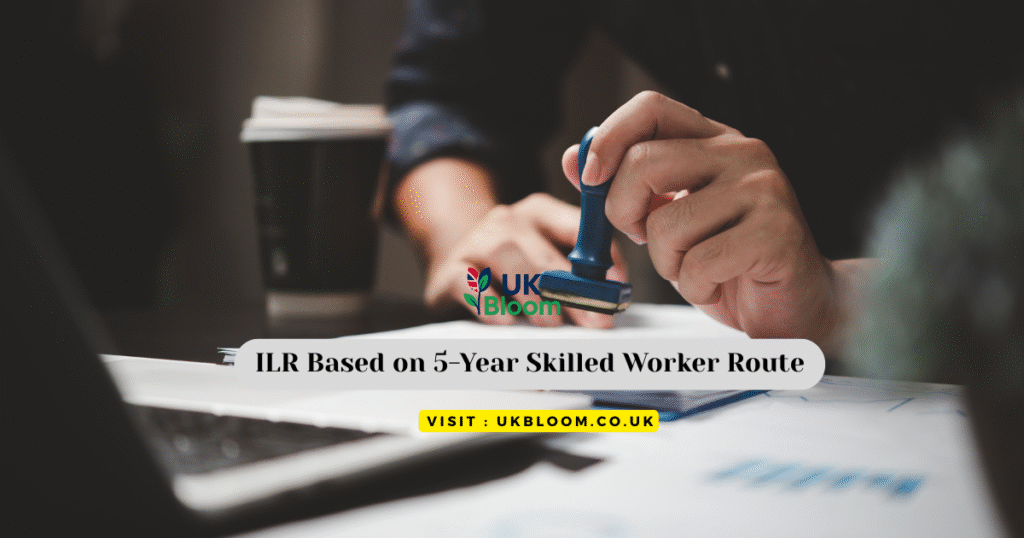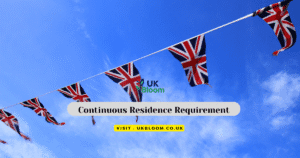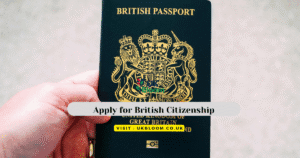Indefinite Leave to Remain (ILR) is a major milestone for Skilled Worker visa holders in the UK. It grants the right to live, work, and study in the UK without time restrictions. In this detailed guide, we explain how you can obtain ILR after completing 5 years under the Skilled Worker route in 2025.
Table of Contents
Understanding ILR Based on 5-Year Skilled Worker Route
The Skilled Worker visa replaced the Tier 2 (General) visa in 2020 and allows non-UK nationals to work in the UK with sponsorship from an approved employer. After 5 continuous years, eligible individuals can apply for ILR, provided they meet specific criteria around residence, earnings, and employment.
Eligibility Criteria for ILR After 5 Years
To apply for ILR based on the Skilled Worker route, you must satisfy a number of criteria. Let’s break them down:
Residence Requirement
You must have lawfully resided in the UK for a continuous 5-year period on the Skilled Worker visa (or a combination of eligible work visas). You must not have spent more than 180 days outside the UK in any 12-month period.
Absences from the UK
The Home Office will scrutinise your travel history:
- Short holidays and business trips are allowed.
- Absences due to COVID-19 or exceptional personal reasons may be excused with valid documentation.
Tip: Keep detailed records of all your travel, including dates and purpose.
Continuous Employment with an Approved Sponsor
You must:
- Still be working for a licensed UK sponsor
- Hold a valid Certificate of Sponsorship (CoS) for your ILR application
- Be in the same occupation code as listed in your visa
Changing jobs is allowed but must be reported and sponsored properly.
Salary Threshold for ILR
You must be earning at least:
- £26,200 per year, or
- £10.75 per hour, or
- The “going rate” for your occupation — whichever is higher.
Some occupations and new entrants may be eligible for reduced thresholds.
Documents Required for ILR Application
The application process requires well-prepared documentation:
- Current passport
- Biometric Residence Permit (BRP)
- Employment letter confirming job role, salary, and continuity
- Payslips for the past 6 months
- P60s or HMRC records
- Life in the UK Test pass certificate
- Proof of continuous residence (e.g., tenancy agreements, utility bills)
- Absence records and travel dates
Step-by-Step ILR Application Process
Step 1: Check Eligibility
Ensure you meet the salary, residence, and employment conditions.
Step 2: Pass the Life in the UK Test
Book your test via the official portal. It’s mandatory for all ILR applicants.
Step 3: Gather Your Documents
Prepare originals and digital copies for upload.
Step 4: Apply Online
Use the Gov.uk ILR application portal to submit your form.
Step 5: Pay the Fee
The ILR fee for 2025 is:
- £2,885 per applicant
- £19.20 for biometric enrolment
Step 6: Attend Your Biometric Appointment
Visit a UKVCAS centre to submit fingerprints and photographs.
Step 7: Wait for a Decision
Processing time is usually 8 weeks, though faster priority services are available for an extra cost.
Fees and Processing Time
| Item | Cost (2025) |
|---|---|
| ILR Application Fee | £2,885 |
| Biometric Enrolment Fee | £19.20 |
| Super Priority Processing (Optional) | £1,000+ |
Dependants Applying for ILR with You
Your spouse/partner and children may also apply for ILR if they have:
- Lived in the UK with you for 5 years
- Met the same absence and residence requirements
- Not breached immigration laws
Each dependant must complete a separate application and pay the full fee.
Switching Visa Categories and Its Impact
If you’ve switched from another work visa to a Skilled Worker visa, the clock resets. Only time spent under qualifying routes such as:
- Tier 2 (General)
- Skilled Worker
…counts towards the 5-year period.
Time on student visas, graduate routes, or visitor visas does not count.
Common Reasons for ILR Refusal
- Excessive absences from the UK
- Salary below the required threshold
- Incorrect or missing documents
- Failure to pass the Life in the UK Test
- Employment not aligned with sponsorship records
Appeals can be made, but reapplying correctly is often faster.
What Happens After You Receive ILR?
- You can live and work in the UK without time limits.
- You’re free from visa renewal costs.
- You may travel freely but should avoid absences of 2+ years to maintain ILR status.
- After 12 months of ILR (or immediately, if married to a British citizen), you may apply for British citizenship.
See our full British Citizenship After ILR Guide.
Internal Links
- Visa Eligibility Calculator
- Skilled Worker Points Calculator
- Life in the UK Test: Mock Exam
- Income Tax Calculator UK
- UK Childcare Cost Calculator
External Links
- GOV.UK – Apply for ILR
- Life in the UK Test Booking
- UKVCAS – Biometrics and Appointments
- UK Immigration Salary Requirements
Disclaimer
This article is intended for informational purposes only and does not substitute professional legal advice. Immigration rules can change frequently. Always refer to official UK government sources or consult with a qualified immigration advisor before submitting an application.
Conclusion
Achieving ILR through the 5-year Skilled Worker route marks a major accomplishment for migrants in the UK. It offers long-term security, stability, and a clear path to British citizenship. By understanding and meeting the eligibility criteria, preparing your documents meticulously, and following the application steps outlined above, you can maximise your chances of success in 2025.
FAQs
1. Can I apply for ILR before 5 years on the Skilled Worker visa?
No, you must complete a full 5-year qualifying period unless applying under a different accelerated route (e.g., Global Talent).
2. Do I need to still work for the same employer?
You can switch employers but must remain in a sponsored Skilled Worker role and meet the salary and occupation requirements.
3. What is the Life in the UK Test?
A multiple-choice test on British values, history, and laws — mandatory for all ILR applicants.
4. How do I prove continuous residence?
Use a combination of HMRC records, utility bills, tenancy agreements, and travel records.
5. Will time on a Graduate visa count towards ILR?
No, only time spent under qualifying work visas like Skilled Worker or Tier 2 (General) counts.







One thought on “ILR Based on 5-Year Skilled Worker Route (2025 Guide)”